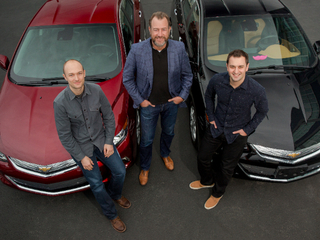Editor’s Note: Our annual Vator Splash Spring 2016 conference is around the corner on May 12, 2016 at the historic Scottish Rite Center in Oakland. Speakers include Nigel Eccles (CEO & Co-founder, FanDuel), Andy Dunn (Founder & CEO, Bonobos), Mitch Kapor (Founder, Kapor Center for Social Impact); Founders of NextDoor, Handy, TubeMogul, TaskEasy; Investors from Khosla Ventures, Javelin Venture Partners, Kapor Capital, Greylock, DFJ, IDG, IVP and more. Join us! REGISTER HERE.
Friends and foes, competitors and collaborators: let’s all join hands to make sure Washington doesn’t get in the way of the future!
A band of technology companies (Google, Lyft, and Uber) have teamed up with major automakers (Ford and Volvo) to form the Self-Driving Coalition for Safer Streets, a lobbying group aiming to influence the federal government into accelerating rules or regulations that would allow self-driving cars on America’s roads.

While all the companies participating in the new coalition have invested time and money in self-driving and other automated driving technologies, there has been a tacit understanding that policies still need to be developed in order to bring those technologies to market. Now they believe the time has come.
The official line from the coalition is that this new lobbying group is primarily about realizing the “safety and societal benefits” made possible through self-driving cars, but it’s clear that this is as much about the very survival of these companies. The ridesharing companies, for example, must have understood longer than everybody that their future profit margins depend on getting rid of the unnecessary expense we call “drivers.” As for the automakers, if the future is self-driving, then they can either be a part of that future or go out of business.
In a classic example of the revolving doors between corporations, lobbying groups, and political office, the coalition also announced that David Strickland will serve as its counsel and spokesperson. Strickland previously served as the Administrator of the National Highway Traffic Safety Administration (NHTSA) from 2010-2014.
“Self-driving vehicle technology will make America’s roadways safer and less congested,” said Strickland in a prepared statement. “The best path for this innovation is to have one clear set of federal standards, and the Coalition will work with policymakers to find the right solutions that will facilitate the deployment of self-driving vehicles.”
Notably absent from the coalition are Tesla and General Motors (GM), two companies that have regularly shown a keen interest in self-driving cars. That said, I did receive a statement from a spokesperson at GM:
“We are not part of this coalition. GM continues to work proactively with Congress, NHTSA, and various state and local governments to spur development of autonomous vehicle technologies as safely and rapidly as possible.”
Last month, GM acquired Cruise Automation, a developer of self-driving technology, for a reported $1 billion. The Detroit corporation has also formed a major partnership with Lyft since investing $500 million in the San Francisco startup, so perhaps having Lyft in the coalition is enough.
Beyond the big names, there are many smaller companies working on self-driving tech. Most recently, a scrappy startup called Comma.ai raised $3.1 million from Andreessen Horowitz to continue developing its artifical-intelligence-based self-driving technology.
Interestingly, it doesn’t seem that the newly formed coalition will face too much of an uphill battle, since the NHTSA earlier this year responded to a letter from Google with promising comments about self-driving cars. Most notably, the agency said that cars don’t actually need a human behind the wheel. Instead, Google’s “self-driving system” could be interpreted as the “driver.” This raises a host of other questions, but it’s still a positive answer to developers of self-driving tech.






















